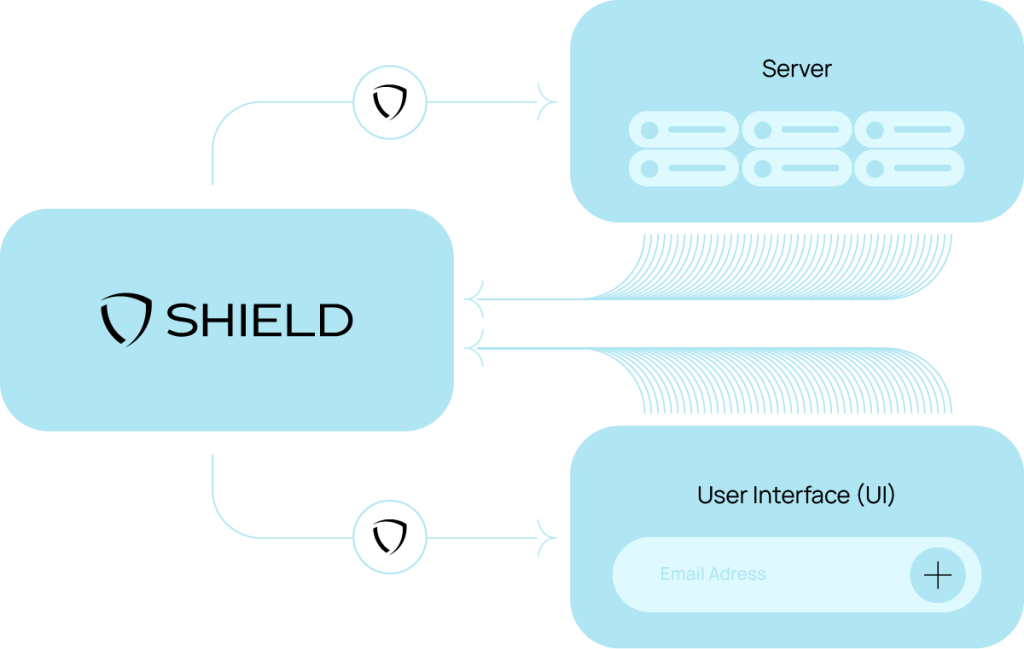Amplify. Secure. Optimise.
What is Shield?
Shield is a middleware solution designed to enhance system integration, security, and performance. It bridges communication between diverse systems and applications. With Shield, businesses achieve seamless interoperability, optimised efficiency, and robust security.
Benefits
Shield simplifies integration challenges, improves system interoperability, enhances security, and boosts overall efficiency, making it an asset for companies in their software architecture and development processes.
01.
Integration
Middleware acts as a bridge between different systems, applications, and databases, enabling seamless communication and data exchange. It simplifies the integration process by handling complex protocols and formats, allowing systems to work together effectively.
02.
Interoperability
Companies often use various software and technologies that may not be inherently compatible. Middleware provides a standardised layer that promotes interoperability, enabling different systems to interact and share data without requiring extensive modifications.
03.
Scalability
As businesses grow and their needs evolve, Shield facilitates scalability. It provides a flexible framework that can accommodate expanding infrastructure, additional users, and increased data volumes, ensuring smooth operations even during periods of growth.
04.
Security and Governance
Shield includes security features such as authentication, encryption, and access control, which enhance the overall security of the system. It helps enforce governance policies, ensuring data integrity, regulatory compliance, and adherence to organisational standards.
05.
Streamlined Development
Middleware can provide pre-built components, libraries, and APIs that accelerate application development. It reduces development time and effort by offering reusable building blocks, allowing developers to focus on business logic rather than low-level integration details.
06.
Performance Optimisation
Shield optimises system performance by implementing caching mechanisms, load balancing, and message queuing. It helps distribute workloads efficiently, enhances response times, and minimises downtime, ensuring a smooth user experience.
How Shield Works
Shield operates as a middleware platform, acting as a bridge between different systems, applications, and databases. It simplifies complex integration tasks by standardising interactions and handling varied protocols and formats. Additionally, Shield incorporates security features such as authentication and encryption, provides scalability tools like load balancing, and offers pre-built components to expedite development.

Is Shield the Solution Your Business Needs?
Every company encounters specific tech obstacles during their digital transformation.
Shield is designed to overcome integration challenges, improve system interoperability, enhance security, and boost overall efficiency, making it a valuable asset for companies in their software architecture and development processes.
These are are the prevalent issues that Shield aims to resolve for businesses:
Many businesses rely on multiple systems, applications, and databases that need to communicate and share data. Middleware simplifies the integration process by providing a unified platform and standardising the interaction between different components, reducing the complexity and effort required for integrations.
Companies often use a mix of technologies, protocols, and standards that may not be inherently compatible. This leads to interoperability challenges and data exchange issues. Middleware acts as a bridge, ensuring seamless communication and compatibility between diverse systems, eliminating incompatibility headaches.
Data fragmentation occurs when information is scattered across various systems and applications, making it difficult to access and consolidate for meaningful insights. Middleware enables data integration, harmonisation, and synchronisation, breaking down data silos and facilitating a unified view of information.
Building custom integrations from scratch can be time-consuming and resource-intensive. Middleware provides pre-built components, libraries, and APIs that accelerate development, reducing the time and effort required to connect systems and applications.
Ensuring data security, access control, and regulatory compliance can be a complex task. Middleware incorporates robust security features, such as encryption, authentication, and access control mechanisms, providing a secure framework for data exchange and enforcing governance policies.
As businesses grow and encounter increased data volumes or user loads, their systems may struggle to handle the additional demands. Middleware offers scalability features like load balancing, caching, and message queuing, optimising system performance and ensuring smooth operations even under high loads.
Some businesses may face challenges due to vendor-specific integrations or proprietary systems that limit their flexibility. Middleware promotes vendor-agnostic integrations, enabling businesses to connect and switch between different software and technologies without being tied to a single vendor.
Is your business ready to unlock the benefits of Shield and reach unparalleled levels of efficiency?
